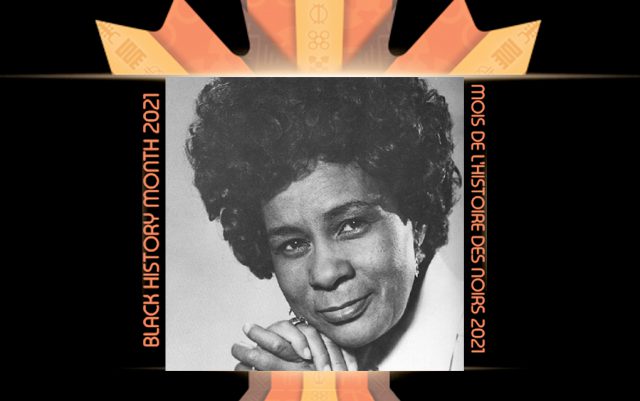Kathleen “Kay” Livingstone (1918-1975) was born in London, Ontario, in 1918. Her parents, James and Christina Jenkins founded the Dawn of Tomorrow, a pioneering publication for Canada’s Black community in 1921. From a young age, she was interested in the performing arts, studying music in Toronto and Ottawa.
During the Second World War, Kay Livingston worked at the Dominion Bureau of Statistics in Ottawa. It was in Ottawa that she began a career as a radio host with “The Kathleen Livingstone Show.” In 1942, she married George Livingstone, and they moved to Toronto where they raised their children. Livingstone maintained her acting career, hosted radio programs on several stations, including the CBC and was called “one of Canada’s leading Black actresses” during this time.
Livingstone worked to break down prejudice and promote equality of individuals of all origins and contributed to the development of a more tolerant society. She was deeply involved in expanding a collective awareness and pride in the Toronto Black community in the post-Second World War period. As well, she worked with the United Nations Association – Toronto Branch Women’s Auxiliary, the local YWCA Foreign Affairs Committee, the National Black Coalition of Canada, the Canadian Council of Churches, the Legal Aid Society, and Heritage Ontario.
Livingstone was a founder of the Canadian Negro Women’s Association (1951). An early Canadian Negro Women’s Association (CANEWA) undertaking, and one which would continue throughout the group’s existence, was the provision of scholarships to deserving Black students. Later activities included the organization of the Calypso Carnival (forerunner of the Caribana Festival) as a fundraiser for other service projects.
Kay Livingstone actively engaged in creating a Canada-wide network of African-Canadian women. She was the driving force behind the first National Black Women’s Congress (1973), providing a national forum to address the concerns of Black women and advance their causes. Perhaps most importantly, the Congress inspired the delegates to maintain close ties with each other, leading to further conventions at Montreal in 1974, Halifax in 1976, Windsor in 1978, and Winnipeg in 1980. It was at the Winnipeg meeting that the Congress of Black Women was formed, an organization which today has over 600 members and is one of Kay Livingstone’s legacies.
In the last years of her life, Kay worked as a consultant to the Privy Council of Canada, travelling the country in preparation for a conference on visible minorities in Canada (a term with which she is credited with coining). One of the people she met on these travels was Carrie Best; it is a credit to Kay Livingstone’s influence that after her death in 1975, Ms. Best formed the Kay Livingstone Visible Minority Women’s Society in her honour, an organization which to this day provides educational funding for deserving young women.
Le Mois de l’histoire des Noirs: Kathleen « Kay » Livingstone
Kathleen « Kay » Livingstone (1918-1975) est née à London, Ontario, en 1918. Ses parents, James et Christina Jenkins ont été les fondateurs du journal Dawn of Tomorrow, une publication avant-gardiste destinée à la communauté noire du Canada en 1921. Dès son enfance, elle s’est intéressée aux arts du spectacle et a étudié la musique à Toronto et à Ottawa.
Pendant la Seconde Guerre mondiale, Kay Livingston a travaillé au Bureau fédéral de la statistique à Ottawa. C’est là qu’elle a entamé une carrière d’animatrice radio au « Kathleen Livingstone Show ». En 1942, elle a épousé George Livingstone; le couple s’est installé à Toronto où ils ont élevé leurs enfants. Mme Livingstone a poursuivi sa carrière d’actrice, diffusé des émissions radiophoniques sur plusieurs stations, y compris la CBC, et a été surnommée « l’une des principales actrices de race noire du Canada » pendant cette période.
Mme Livingstone a œuvré pour l’élimination des préjugés et la reconnaissance de l’égalité des personnes de toutes origines, contribuant ainsi à l’essor d’une société plus tolérante. Elle a été aussi étroitement associée à la croissance d’une conscience collective et d’une fierté au sein de la communauté noire lors de l’après-guerre et a contribué au mieux-être de la société par son travail auprès de la section féminine de Toronto de l’Association canadienne pour les Nations Unies, du comité des affaires internationales du conseil local de la YWCA, de la Ligue nationale des Noirs du Canada, du Conseil canadien des Églises, de la Société d’aide juridique et de Heritage Ontario.
Mme Livingstone est l’une des fondatrices de la Canadian Negro Women’s Association (1951). Une des premières initiatives de la Canadian Negro Women’s Association (CANEWA), qui se poursuivra tout au long de l’existence du groupe, consistait à offrir des bourses d’études à des étudiants noirs méritants. Au nombre des activités ultérieures de l’association figurait l’organisation du Carnaval de Calypso (précurseur du Festival Caribana) afin de recueillir des fonds pour d’autres projets de services.
Kay Livingstone a participé activement à la création d’un réseau de femmes afro-canadiennes à l’échelle du pays. Elle a été la force motrice à l’origine du premier Congrès national des femmes noires (1973), qui sert de tribune où sont abordés les préoccupations et les intérêts des femmes noires. Fait peut-être le plus important, le Congrès a incité les déléguées à conserver d’étroits liens entre elles, ce qui a conduit à l’organisation d’autres conventions, à Montréal en 1974, à Halifax en 1976, à Windsor en 1978 et à Winnipeg en 1980. Lors de la réunion de Winnipeg, le Congrès des femmes noires a été créé, une organisation qui compte aujourd’hui plus de 600 membres et qui est l’un des legs de Kay Livingstone.
Au cours des dernières années de sa vie, Kay a travaillé comme experte-conseil auprès du Conseil privé de la Reine pour le Canada et a parcouru le pays en vue de préparer une conférence sur les minorités visibles au Canada (une expression qui lui est attribuée). L’une des personnes qu’elle a rencontrées lors de ses déplacements est Carrie Best; c’est en l’honneur de l’influence de Kay Livingstone qu’après son décès, en 1975, Mme Best a fondé en sa mémoire la Kay Livingstone Visible Minority Women’s Society, une organisation qui jusqu’à ce jour verse des fonds pour l’éducation de jeunes femmes méritantes.












